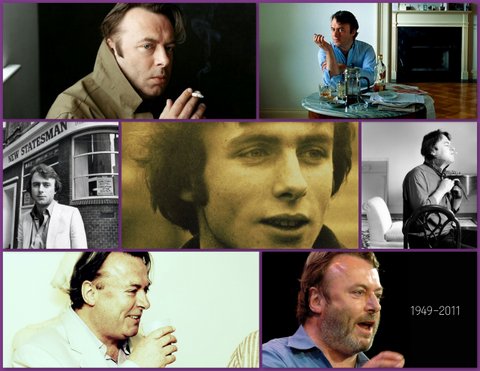Public intellectual. Wit. Raconteur. Prolific writer, drinker and smoker.
Christopher Hitchens would have turned 64 tomorrow. The world has been a little less interesting since he died of complications related to esophageal cancer sixteen months ago. I was–am–a huge fan; I didn’t agree with everything he had to say, but there was no one else who came close to matching his passion, wit and erudition in delivering both the written and spoken word. And he challenged people. The one time I saw him in person, when he sparred–verbally–with Oliver Stone on a panel at the New York Film Festival less than one month after the 9/11 attacks, was quite memorable. (He mentions the encounter in this piece from The Atlantic).
For my Hitchens ‘moment’, my intent had been to find a representative clip, on YouTube, of him holding forth at any number of symposia, round table discussions, one-on-one interviews, or late night talk shows. That there was ultimately too much to choose from is, for fans like me, a blessing; in addition to living on in written form via his many books, columns and essays, he lives on in audiovisual form as well. And let’s face it, the man had one of the best voices ever. So, if you have the time and the inclination, visit YouTube and do a search on ‘Christopher Hitchens’; depending on where you stand, you’ll find plenty to make you laugh, fume, wince, think and, perhaps, question your own stances on things.
What I’ll post here instead is an excerpt of the remembrance that Scott Simon shared with Weekend Edition listeners on the Saturday after ‘Hitch’ died in December of 2011.
“[You] couldn’t fix a label on Christopher Hitchens; that’s why he was worth reading and hearing.
He called himself a Trotskyite-Marxist in the 1970s, though he seemed much funnier to me than whatever I ever imagined a Trotskyite-Marxist to be. A number of years ago, after his falling out with The Nation magazine, people stopped referring to him as liberal. A little after that, as he became outspoken about his atheism, they stopped referring to him as a conservative. By the time he died, no label applied to Christopher Hitchens. I think he worked hard to achieve that.
We often seem to treat consistency of thought as a sign of character. Politicians and pundits are applauded for repeating themselves. Observers and activists say, “Aha!” if they discover a distance between what some public figure believed five years or five months ago, and what they say today. Compromise is difficult when changing your beliefs is taken to be a moral cave-in instead of the sign of a curious, lively mind.
But I wonder if always making consistency into a virtue is wise for anyone. Why strive to enjoy a rich life, filled with the deep, transforming experiences of family, travel, learning, love, daring, triumph and loss if you’re determined just to cling to the same ideas that you’ve always had?
I think Christopher Hitchens enjoyed his rumpled, smoking, tippling, blue-eyed lizard caricature. But he was also a prolific and inspired writer, and a restless thinker who challenged his own certitudes. He thought and drank deeply and gabbed with people for hours on end wherever he went and let his thoughts be shaken by life. He was aggressively inconsistent.
“There are days when I miss my old convictions as if they were an amputated limb,” Christopher Hitchens wrote recently. “But in general I feel better, and no less radical, and you will feel better too, I guarantee, once you leave hold of the doctrinaire and allow your chainless mind to do its own thinking.”
Trivia tidbit: Hitchens shared a birthday with Thomas Jefferson, the subject of one of his many books, and when he was sworn in as an American citizen in 2007, the ceremony was held on 13 April 2007 at the Jefferson Memorial.

Great post. I am a huge Christopher Hitchens fan, too. Though I didn’t agree with everything he said, I so much admire the eloquence, passion and charisma with which he delivered it all.
LikeLike
Thanks for stopping by, Emily. During my search for a single, representative Hitchens video to include in my post, I found this, which I hadn’t realized was available: http://www.youtube.com/watch?v=Er8YIqfOy60&playnext=1&list=PLA5E8A3CD29209123&feature=results_main; it’s a video of his memorial service from last April, at which many of his closest friends and colleagues spoke. Good stuff.
LikeLike